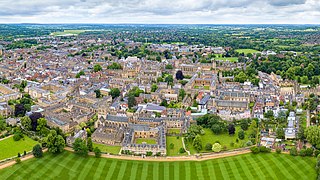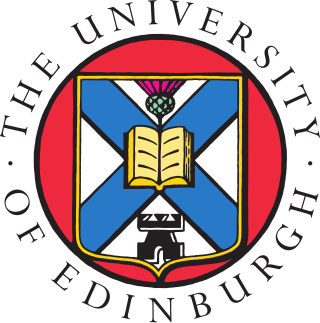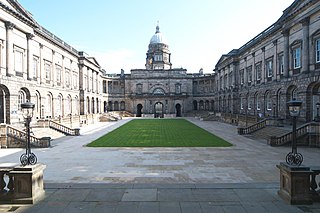
The ancient universities are British and Irish medieval universities and early modern universities founded before the year 1600. Four of these are located in Scotland, two in England, and one in Ireland. The ancient universities in Great Britain and Ireland are amongst the oldest extant universities in the world. The ancient universities in Britain are part of twenty-seven culturally significant institutions recognised by the British monarchy as privileged bodies of the United Kingdom.

A royal charter is a formal grant issued by a monarch under royal prerogative as letters patent. Historically, they have been used to promulgate public laws, the most famous example being the English Magna Carta of 1215, but since the 14th century have only been used in place of private acts to grant a right or power to an individual or a body corporate. They were, and are still, used to establish significant organisations such as boroughs, universities and learned societies.
The Engineering Council is the UK's regulatory authority for registration of Chartered and Incorporated engineers and engineering technician. The Engineering Council holds the national registers of over 228,000 Engineering Technicians (EngTech), Incorporated Engineers (IEng), Chartered Engineers (CEng) and Information and Communications Technology Technicians (ICTTech). The Engineering Council is also responsible for establishing and upholding globally acknowledged benchmarks of professional competence and ethical conduct, which govern the award and retention of these titles. This guarantees that employers, government bodies, and the broader society, both within the UK and abroad, can place their trust in the expertise, experience, and dedication of engineers and technicians who are professionally registered with the Engineering Council.

Brigadier-General Sir Alexander Gibb was a Scottish civil engineer. After serving as Civil Engineer-in-Chief to the Admiralty and Director-General of Civil Engineering at the Ministry of Transport, he established the engineering consultancy firm Sir Alexander Gibb & Partners.

The third-oldest university in England debate has been carried out since the mid-19th century, with rival claims being made originally by Durham University as the third-oldest officially recognised university (1832) and the third to confer degrees (1837) and the University of London as the third university to be granted a royal charter (1836). These have been joined more recently by University College London as it was founded as London University (1826) and was the third-oldest university institution to start teaching (1828) and by King's College London. Most historians identify Durham as the third-oldest, following standard practice in how a university is defined and how this is applied historically, although the popular press is more divided.

Sir John Boothman StuttardKStJ JP FCA is an English chartered accountant who was Lord Mayor of the City of London from 2006 to 2007.

Sir William Arnot Wakeham FREng is a British chemical engineer. From 2001 to 2009 he was Vice-Chancellor of the University of Southampton.

University College London (UCL) was founded on 11 February 1826, under the name London University, as a secular alternative to the strictly religious universities of Oxford and Cambridge. It was founded with the intention from the beginning of it being a university, not a college or institute. However its founders encountered strong opposition from the Church of England, the existing universities and the medical schools which prevented them from securing the Royal Charter under the title of "university" that would grant "London University" official recognition and allow it to award degrees. It was not until 1836, when the latter-day University of London was established, that it was legally recognised and granted the authority to submit students for the degree examinations of the University of London.
A chartered professional is a person who has gained a specific level of skill or competence in a particular field of work, which has been recognised by the award of a formal credential by a relevant professional organization. Chartered status is considered a mark of professional competency, and is awarded mainly by chartered professional bodies and learned societies. Common in Britain, it is also used in Ireland, the United States and the Commonwealth, and has been adopted by organizations around the world.

The University of Edinburgh is a public research university based in Edinburgh, Scotland. Founded by the town council under the authority of a royal charter from King James VI in 1582 and officially opened in 1583, it is one of Scotland's four ancient universities and the sixth-oldest university in continuous operation in the English-speaking world. The university played a crucial role in Edinburgh becoming a leading intellectual centre during the Scottish Enlightenment and contributed to the city being nicknamed the "Athens of the North".
John Baxter, is a British nuclear engineer, and currently the Group Engineering Director at BP.
Sir Alistair George James MacFarlane was a Scottish electrical engineer and leading academic who served as Principal and Vice Chancellor of Heriot-Watt University, Edinburgh, and Rector, University of the Highlands and Islands.
Chartered Security Professional (CSyP) is a professional certification in security offered by the Worshipful Company of Security Professionals, a livery company in the City of London. The certification has been established to show the attainment of strategic and higher operational level competencies in security. The Register of Chartered Security Professionals is managed by the Security Institute and overseen by the Chartered Security Professionals Registration Authority (CSPRA).

The Regius Chair of Engineering is a royal professorship in engineering, established since 1868 in the University of Edinburgh, Scotland. The chair is attached to the University's College of Science and Engineering, based in the King's Buildings in Edinburgh. Appointment to the Regius Chair is by Royal Warrant from the British monarch, on the recommendation of Scotland's First Minister.
George Frederick Armstrong,, was a distinguished 19th century English academic specialising in railway, civil, and sanitary engineering who served as the Regius Professor of Engineering at the University of Edinburgh. Over the course of his life he became a member of many learned societies and the author of many papers and lectures.
Isobel Anne Pollock-Hulf is visiting professor in Engineering and Design at the University of Leeds.








